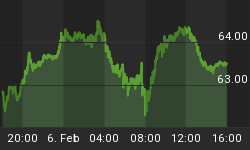As China grapples with the consequences of its devastating earthquake, it has also begun to finally confront the destabilizing forces bubbling up beneath its economic landscape. This week, several key Chinese officials, typically not known for their candor, conspicuously noted the need to both stimulate domestic consumer spending and bring down roaring inflation. While at first blush these two goals might appear mutually exclusive, China's leaders do have a magic bullet that can hit both targets at once.
A stronger currency, commensurate with China's increased economic strength, will both tamp down inflation and allow Chinese consumers to buy more goods and services. However, for reasons not entirely clear to me, or few others for that matter, China's leaders are resisting this simple and beneficial solution.
The Chinese leadership's stated goal in prodding their citizens to spend more is to decrease their economy's dependence on exports. If the Chinese, who currently save 50% of their incomes, saved less, more of their production would be consumed locally. As a result, China would be less vulnerable to economic downturns abroad. Without a vibrant domestic market, over-leveraged Americans will apparently remain China's most important customers.
A strengthened Yuan would lower the real costs of goods for domestic consumers and allow the Chinese themselves to compete more evenly with consumers in other nations to whom they currently send the fruits of their labor. As goods become more affordable in China, the Chinese will naturally consume more. A rising Yuan would therefore kill two birds with one stone: it would reverse recent consumer price increases and it would induce Chinese consumers to buy their own products.
If the Chinese were to follow such a sensible path, the consequences here in America would be immediate and severe. By allowing their currency to appreciate, Chinese monetary authorities would no longer need to buy and remove as many dollars from the open market, producing an immediate reduction in the demand for U.S. Treasuries, mortgage backed securities and other U.S. dollar denominated debt. The result in America would be a simultaneous increase in both consumer prices and interest rates. Such developments would only compound the problems already rippling through our economy.
To spur domestic spending absent such currency rebalancing, Beijing must instead rely on the nominative, simulative effects of inflation. By further expanding their money supply and allowing those increases to be passed on to workers in the form of higher wages, Chinese consumers will have more Yuan to spend and hence will buy more. However, such a policy will only solve one problem by aggravating the other.
Further, by penalizing savers through the erosive effects of inflation, China would discourage savings and jeopardize one of the true sources of its rising living standards. Contrary to the economic hocus pocus propagated on Wall Street, Washington and at American universities; economies grow not as a result of consumer spending, but as a result of savings. Under consumption is the true source of prosperity as it engenders capital formation, which lies at the root of sustainable economic growth.
Here too the implications for Americans are dire. In effect, by only spending half of their incomes and lending much of the rest to us, Americans have merely been enjoying the current consumption that more frugal Chinese consumers have decided to defer. As the Chinese consume more, Americans will simply be forced to consume less.
Low prices and rich consumers are a potent concoction that is sure to soothe China's roaring economy while raising the living standards of its hard working citizens. It's a simple solution that only an economist can miss.
For a more in depth analysis of our financial problems and the inherent dangers they pose for the U.S. economy and U.S. dollar denominated investments, read my new book "Crash Proof: How to Profit from the Coming Economic Collapse." Click here to order a copy today.
More importantly, don't wait for reality to set in. Protect your wealth and preserve your purchasing power before it's too late. Discover the best way to buy gold at www.goldyoucanfold.com, download my free research report on the powerful case for investing in foreign equities available at www.researchreportone.com, and subscribe to my free, on-line investment newsletter at http://www.europac.net/newsletter/newsletter.asp.















